Ten years ago, getting a tattoo in Shanghai required a certain degree of guile. Firstly, would-be recipients would need to seek out a tattooist, of which there were surprisingly few. This was done without the aid of smartphones or online directories – and usually required knowing other people with tattoos (no easy feat).
Secondly, having located a tattooist – most likely someone unskilled and not equipped with modern technology, such as a tattoo gun – recipients would be faced with an even tougher challenge: devising a plan to conceal their new inking.
It may seem hard to believe today, but the idea of tattoos as socially acceptable – something to be shown off, rather than hidden away – is a relatively new phenomena.
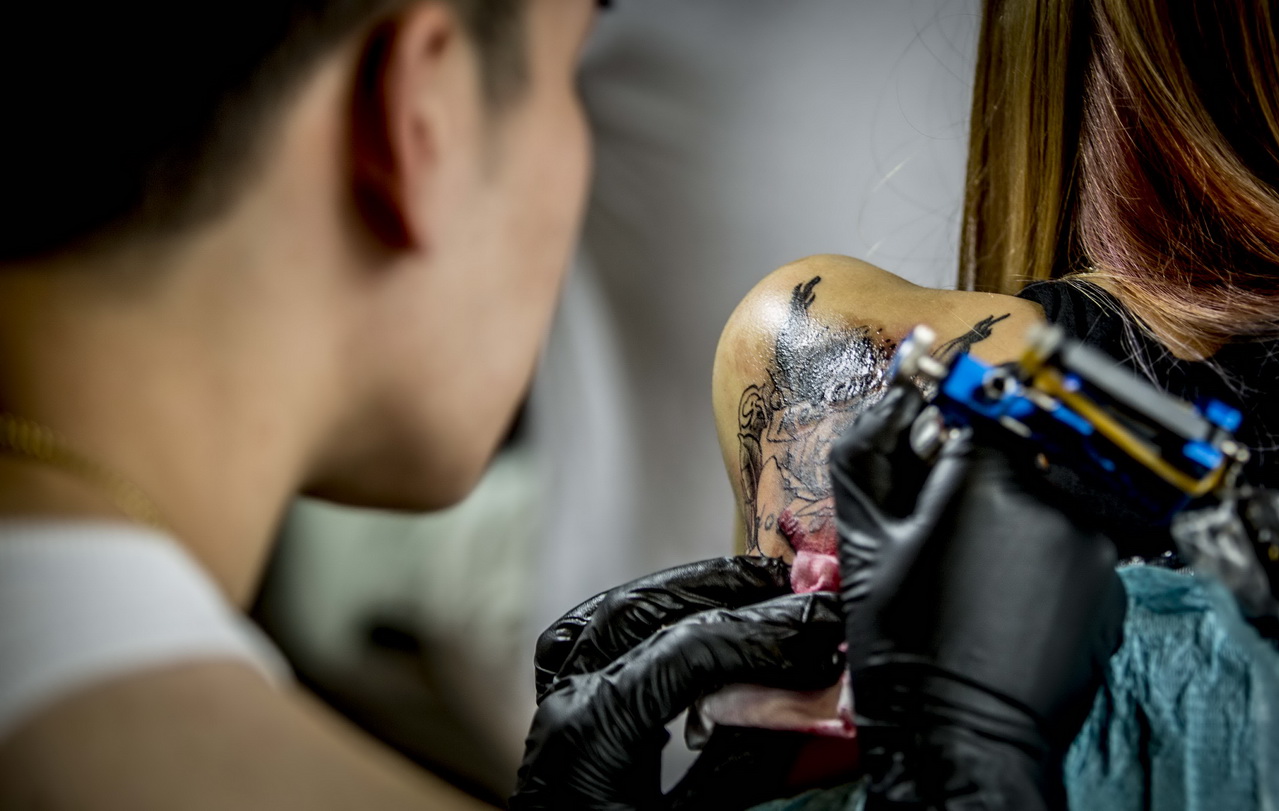
For much of China’s recent history, tattooing has been dangerously taboo, intimately linked with criminality, banditry and disreputableness.
“For the older generation of Chinese people, tattoos are still associated with low status or the criminal underworld,” says Shao Gang, one of Shanghai’s – and China’s most renowned tattoo artists – “perceptions have only shifted over the last decade or so.”
Since the late 12th century, children throughout China have grown up learning of the legend of Yue Fei, a Song Dynasty general whose mother tattooed ‘serve the country with ultimate loyalty’ across his shoulders with an old sewing needle before sending him back to the frontline. But although General Yue would go on to win the war, his deeds did little to reverse attitudes towards tattooing. If anything, Yue’s tattoo, which his mother administered as punishment when he returned home from the battlefield prematurely, helped cement public opinion. Tattooing was dishonorable and something that upstanding people should avoid.
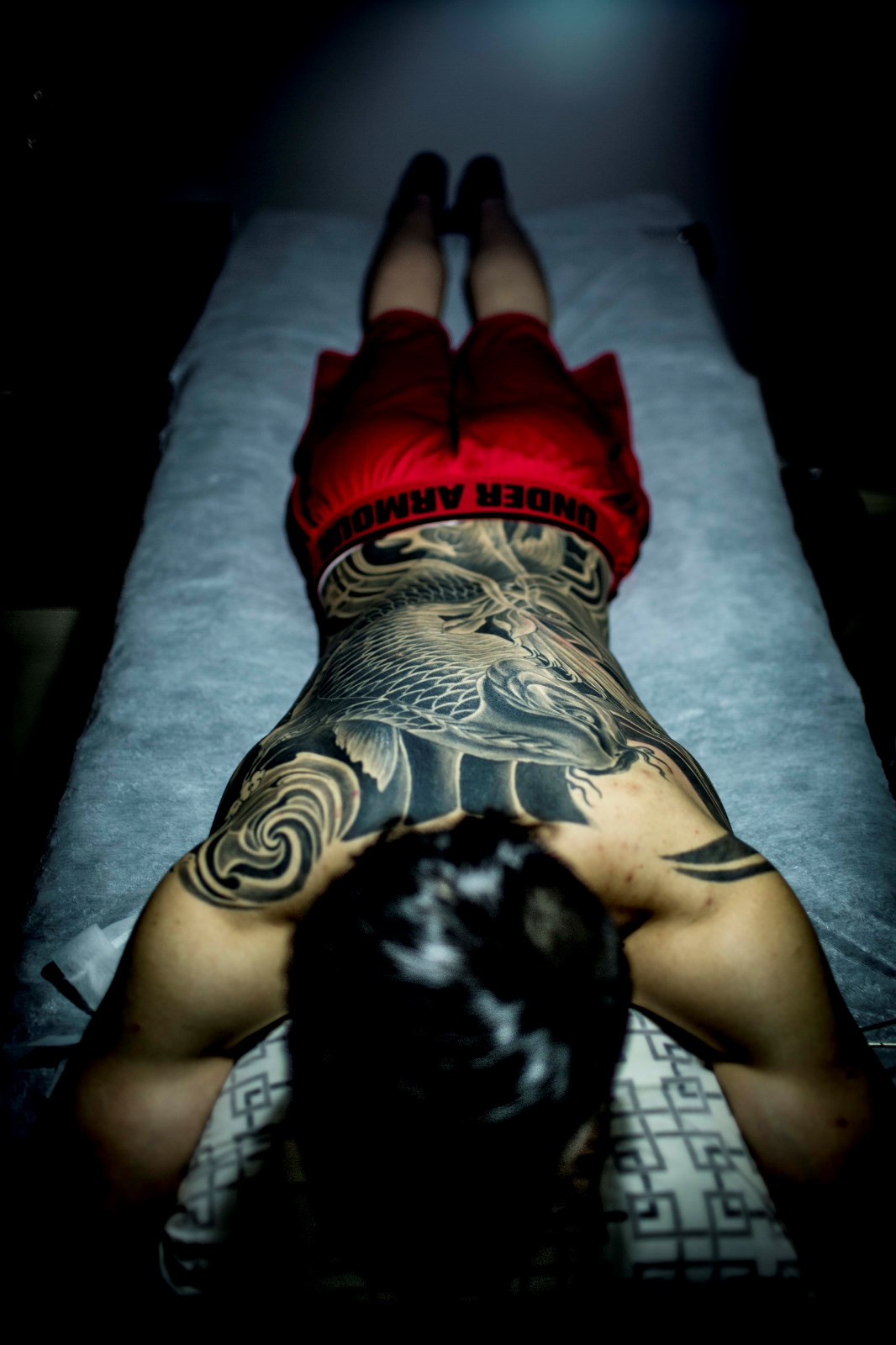
This view was aided by the longstanding imperial practice of tattooing criminals’ faces to warn others of their crimes before casting them out into exile. Encountering a man with a tattoo was a sure sign of danger – especially if the marking on his face read “刺客” [assassin].
The notoriety attached to tattooing resulted in its adoption by organized crime syndicates, especially in the south of the country, where groups such as the Triads began using large dragon and tiger insignia as a means of imposing loyalty and fear.
As a result of its unsavory associations, the Communist Party moved to prohibit tattooing after coming to power in 1949. Chairman Mao himself was said to detest the practice – and drafted a law preventing those with tattoos from joining the military.
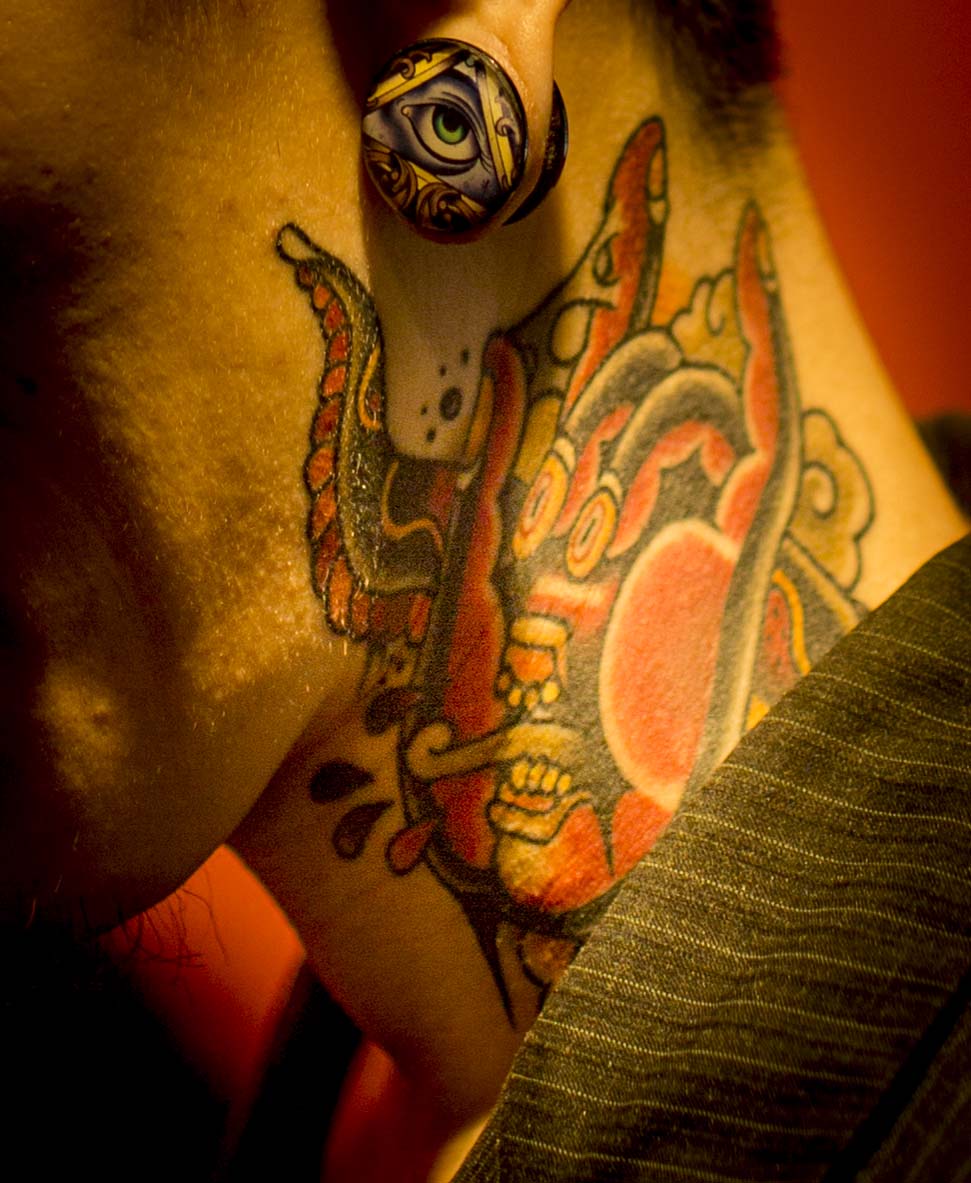
But attitudes to tattooing are changing rapidly, especially in Shanghai, where demand continues to outstrip supply. It is now estimated the city is home to as many as 2,000 tattooists. Yet despite the growth, waiting times for the city’s top artists typically exceeds six months or more.
In order to help find that sense of originality, the city’s tattoo community is increasingly looking inward – and rediscovering China’s own tattoo traditions. Though never part of mainstream culture, the country is home to a number of venerable tattoo cultures, most notably among the Dulong and Dai ethnic groups. This fusion of modern Western practices with Eastern symbolism is helping to create a new tattoo language unique to China.
Below, we enter into the studios and workspaces of Shanghai’s leading tattoo artists, explore their styles and find out their views on the city’s nascent tattoo culture. Is the sudden increase in tattoos among young Chinese people just a passing fad, or are we witnessing the start of a new form of cultural identity?
Shang Qing 上卿

I got my very first tattoo during my sophomore year in college. I was studying at Xi’an Academy of Fine Arts and was expected to become a designer rather than a tattoo artist, but body art piqued my interest. I first took it as a fun thing to do, then decided to study it. It was a decision that no doubt surprised my family and friends – people with tattoos were still pretty ostracized back then, and pursuing a career in the field wasn’t exactly seen as reassuring.
A tattoo can be a piece of art. Unlike pure art, however, it’s also a project you have to co-create with your client. It’s based on trust – people come to you to have their skin marked for life – and that awareness really goes into my artistic process.
I moved to Shanghai in 2006 and started working as a professional tattoo artist that same year. The timing was not exactly ideal – there were a lot of tattoo parlors opening up back then and competition was fierce. I started with a tiny street shop in Xujiahui. I first did quite small tattoos – as a tattoo artist, you have to become confident and familiar with different skin textures before doing big ones.
Like most tattoo artists, the beginning wasn’t easy. Nobody here knew me, which meant business was hard to come by. In my case, I was lucky enough to have friends helping me promoting my work. 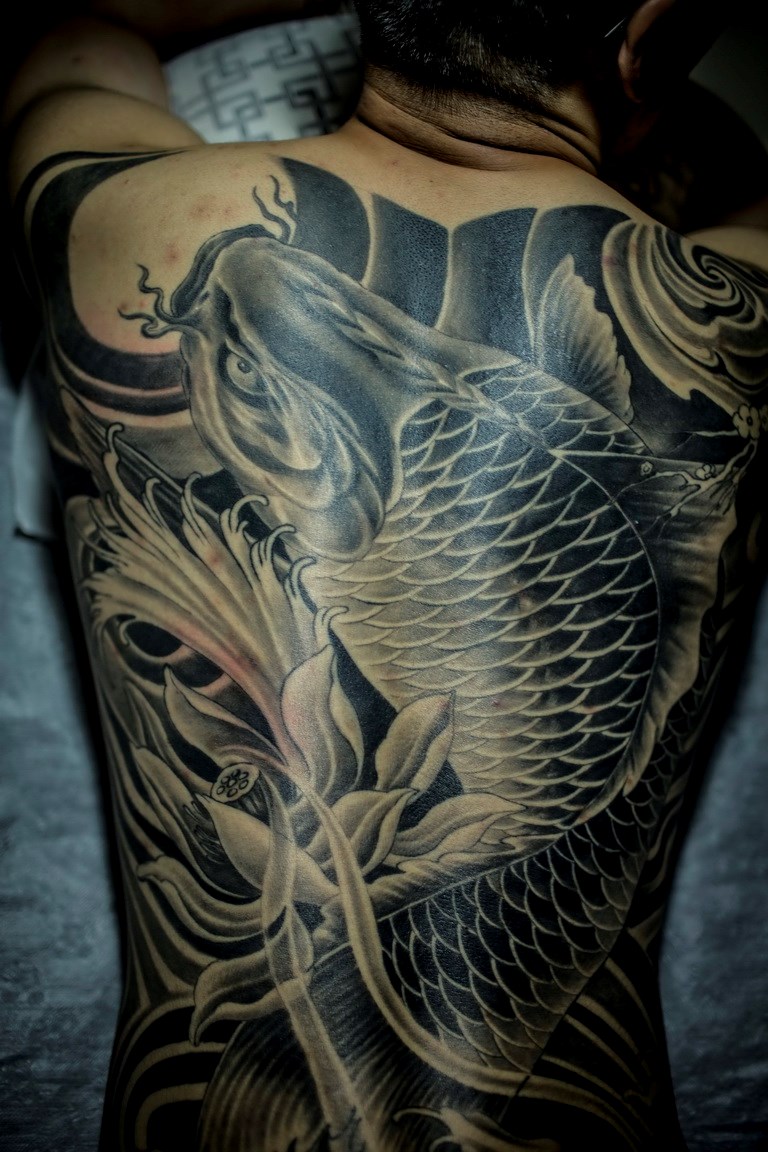
Work began getting steady after about one year. I decided to move to Lujiabang Lu, into this apartment, away from the street. To me, body art is a delicate craft, and each piece of work I do deserves my full devotion and attention. Being ‘hidden’ here allows me to do that.
These days, I charge RMB20,000-50,000 for large-size tattoos. Clients usually come to me with an idea and I add to it to create my own motifs.
I strongly believe a tattoo can be a piece of art. Unlike pure art, however, it’s also a project you have to co-create with your client. It’s based on trust – people come to you to have their skin marked for life – and that awareness really goes into my artistic process. I don’t mind taking fewer orders and customers, but once I do, I will make sure that no work leaves space for regret. It’s an attitude that pays off, I think – most people who find me tend to return time and again.
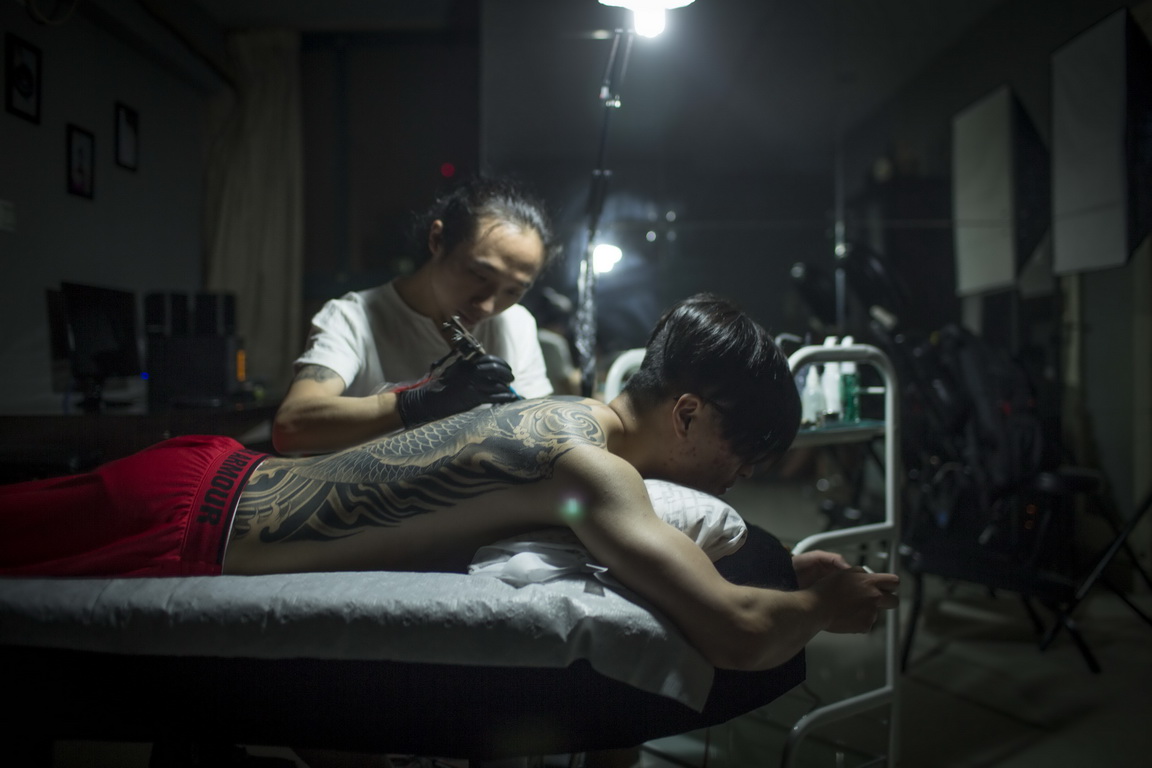
What I’ve found interesting over the years is how my clientele has changed. When tattoos started being a trend in China, it was still mostly ‘outcasts’ who used to get them – Harley-Davidson bikers, slightly intimidating types. Now I get a lot of bank clerks, or lawyers. Society has become much more open-minded about it.
The industry has grown too – there are a lot of genuine tattoo artists out there, but also really good studios. Tattoo culture is developing. Ten years ago, there were no opportunities to learn systematically about body art. If you wanted to get good at it, you’d have to practice on friends – and vice versa. A buddy/mentor of mine did one of my largest tattoos, for instance. Things have come pretty far from that.
Huang Wu 黄武
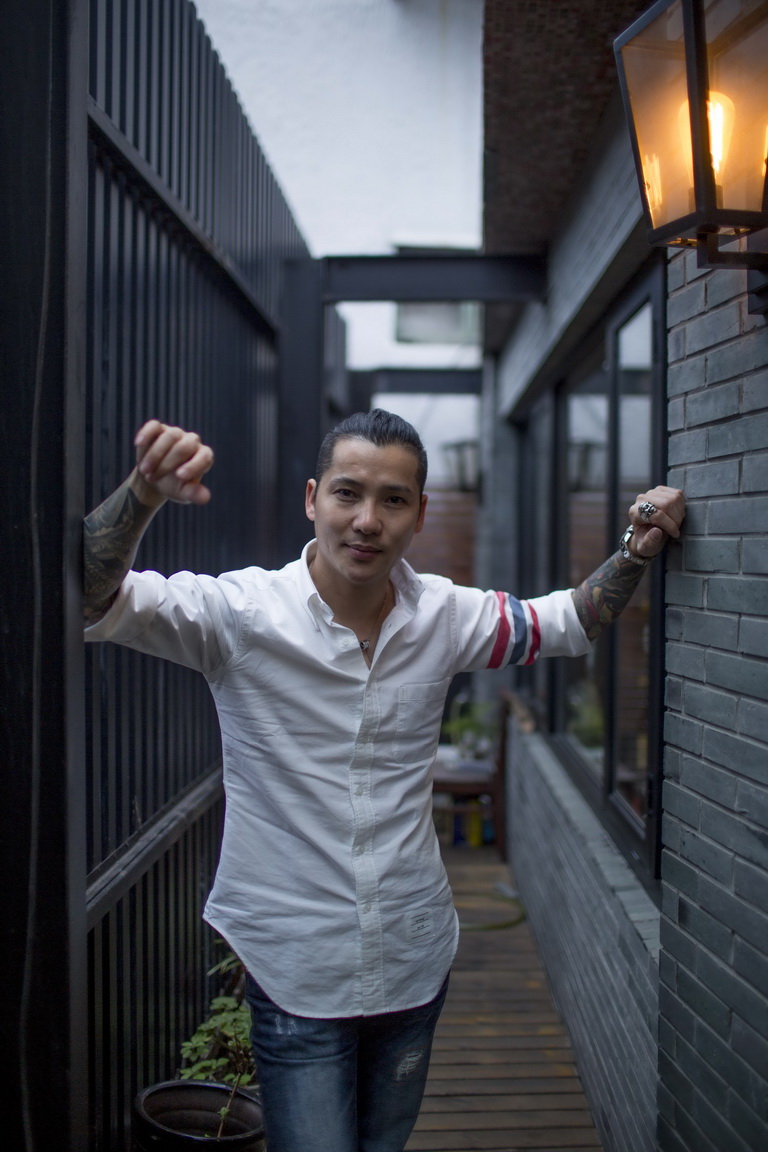
The first time I set foot in a tattoo shop was when I accompanied my friend to get a tattoo, here in Shanghai almost two decades ago. I was almost instantly attracted by the vibe of the place. It was an art form I had never witnessed before, not on real people at least. Once I got my first one, I became addicted to the pain that comes from the process of getting your skin marked. I find it almost beautiful.
I’ve always loved drawing – I majored in architecture and design so the leap into tattoo artistry was a way to break free for me. As a designer, I didn’t get a chance to do my own thing. My job was repetitive, quite dull. I was mostly obliged to work on whatever clients requested. I figured becoming a tattoo artist would give me more freedom.
Getting started in the industry was tough. There were times when I went for three days without eating – I would just have the occasional bowl of instant noodles – so that I could keep my studio open.
After I got hooked on body art, I started learning about it in a serious, committed way. That was in 2000, though I didn’t open my studio till 2004. The first three years were extremely challenging – no reputation and no helpers meant no patrons and no money.
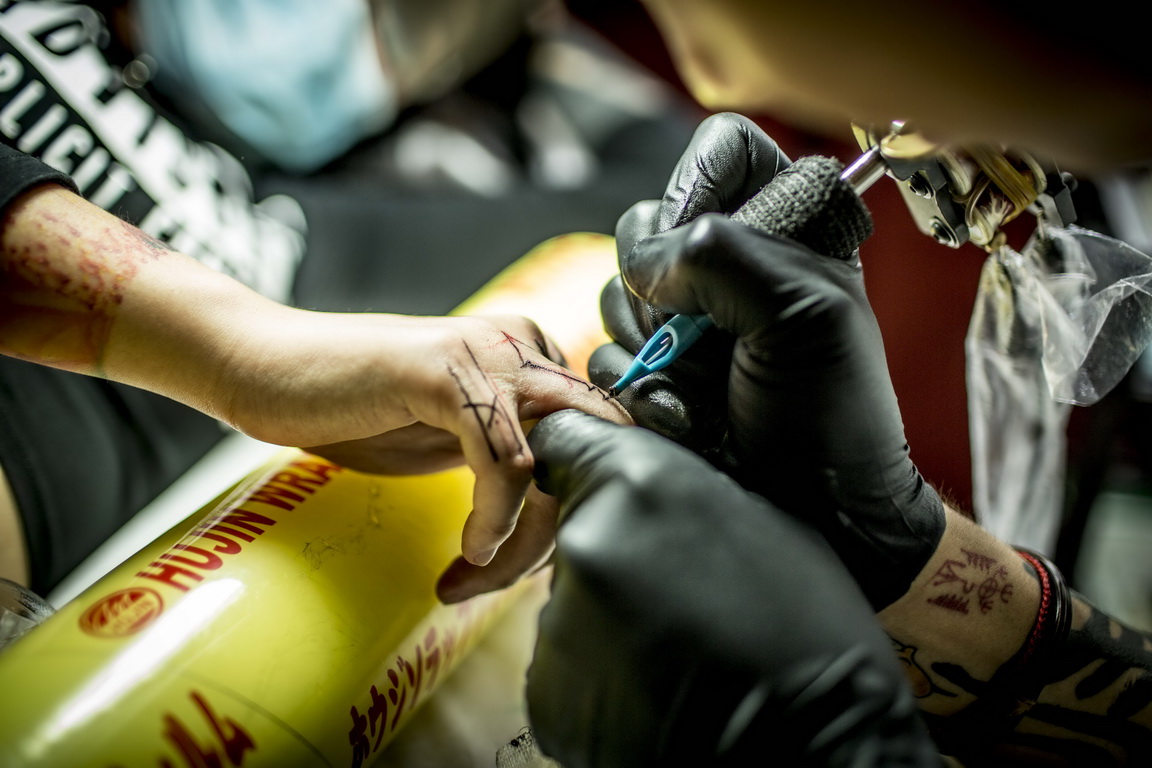
There were times when I went for three days without eating – I would just have the occasional bowl of instant noodles – so that I could keep the studio open. Then Weibo became big, I got on it and things started improving.
It has been a tough journey. China had no reliable sources of information about the industry, or the technology you’d find in the West. We had to work with what we had. There were no schools or academies of any kind. Things began improving once a few foreign tattoo artists came in. They started giving trainings, hosting workshops.
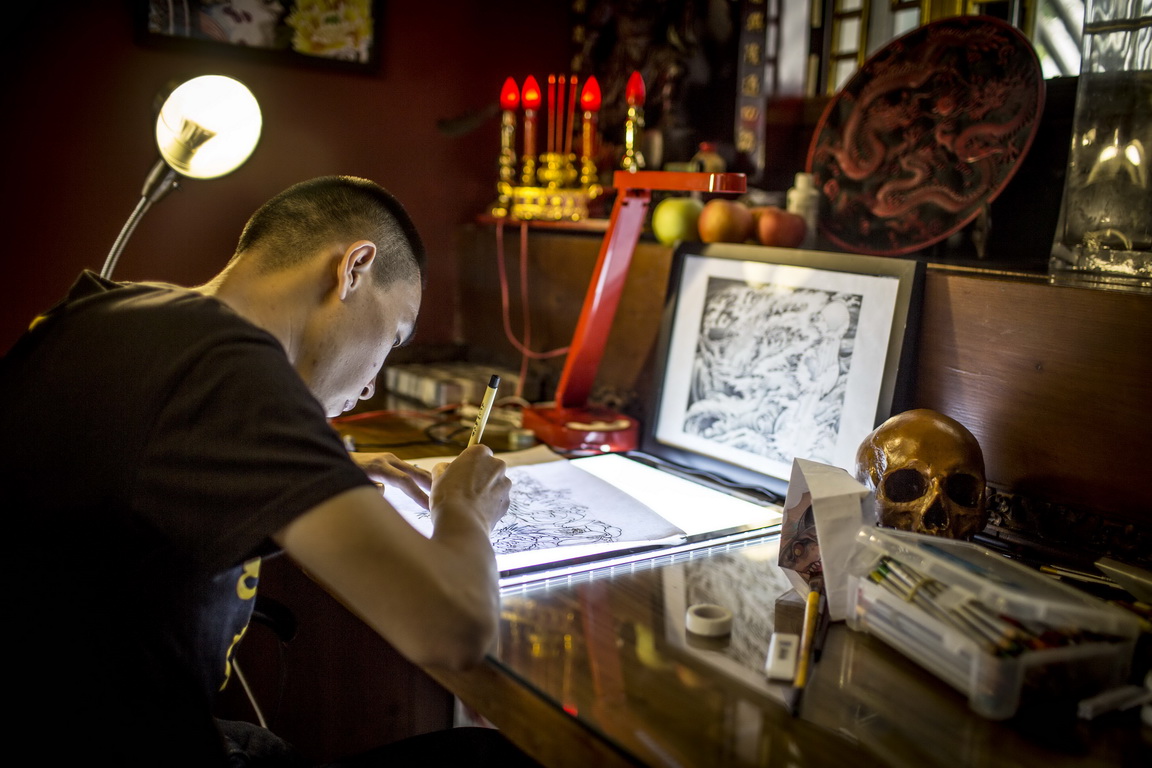
Many Chinese are still relatively conservative when it comes to tattoos, particularly the older generations. They aren’t too familiar with the culture. For a lot of people, a tattoo is a gangster's mark or a sign of someone’s low status. That’s very true in smaller cities.
Being in Shanghai makes it easier, of course. Most of my clients come from a good background, they are well read and they respect this art form. Still, whenever they come to me, I feel I need to educate them about it.
I am currently doing more managing than tattooing: I have a team of excellent tattoo artists to help me with the business. When I do do a tattoo, I usually charge RMB3,000 per hour for small ones and RMB2,000 per hour for large ones. A large tattoo could take up to 50 hours, or even longer.
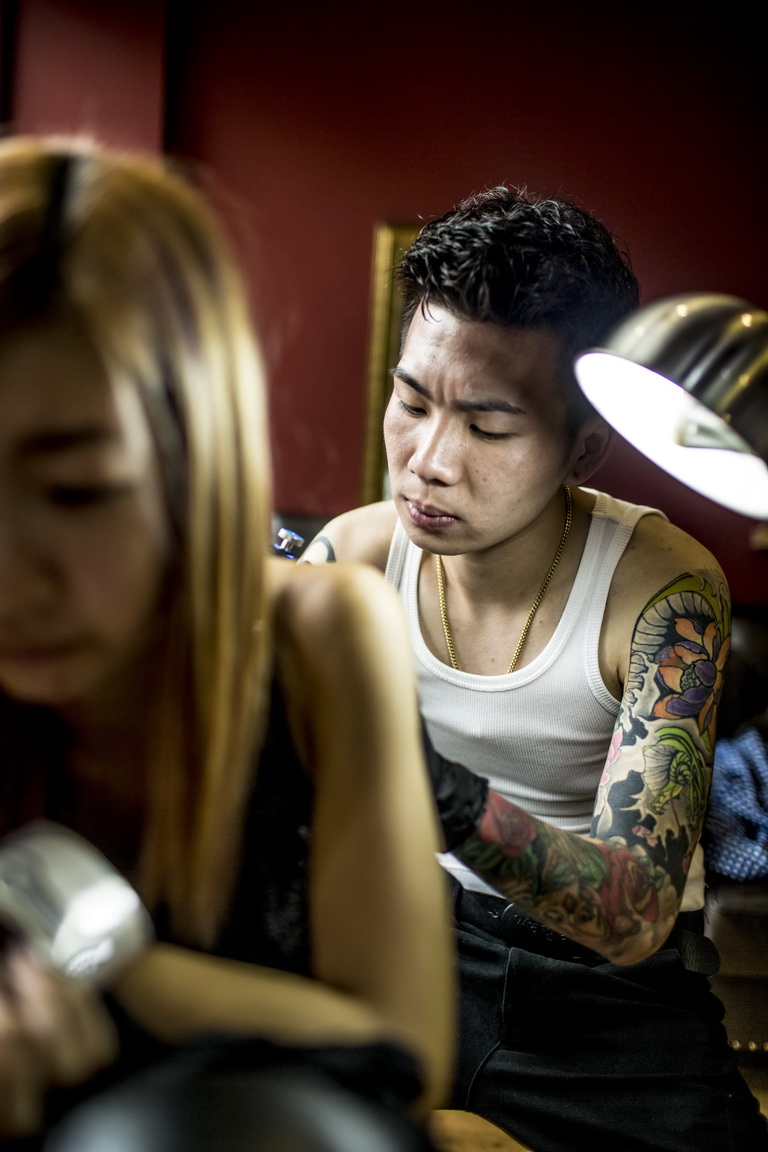
I don’t like the idea of random tattoos on your body – I think a tattoo should follow individual lines, to make your personality stand out.
My clients usually come to me with a rough concept of what they’d like, and ask for my suggestions. Before starting any work, I always ask three questions: 1) Are you ABSOLUTELY sure about getting a tattoo? 2) Where do you want to have it? 3) Which style do you prefer? I also try to learn about their occupation, to make sure that getting inked would not have any potentially negative influence on their career. If their decisions were made on a whim, I’d talk them out of it.
A few days ago, for instance, I received four calls from a customer who insisted on having his wife’s name tattooed on his face. He even came to the studio with her. I could tell that it was not a rational decision, so I turned him down. I could only assume that he had done something to upset the wife badly and she wanted payback.
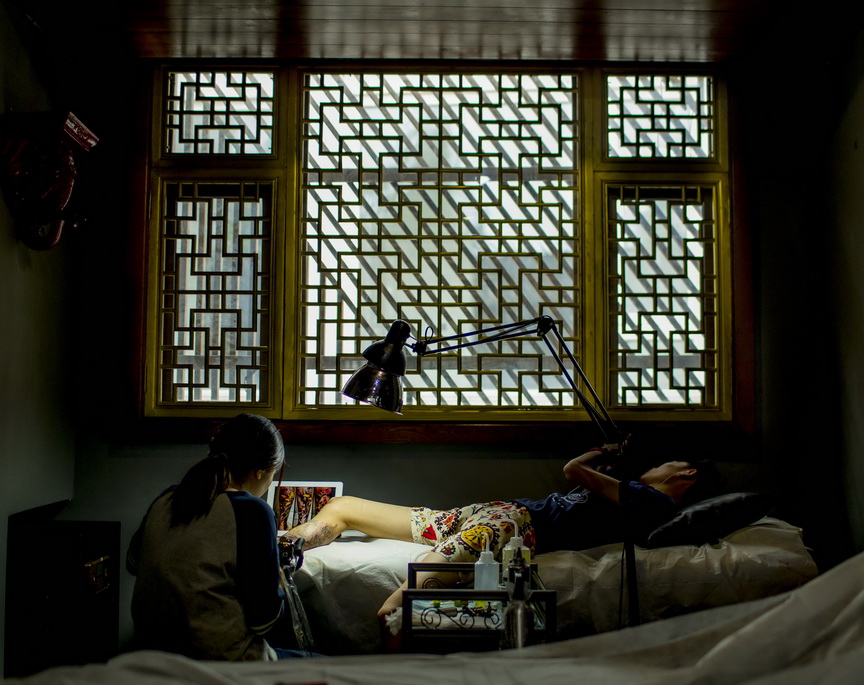
As a Chinese tattoo artist, I tend to prefer traditional styles like dragon, phoenix, fish and characters from old folklore, though skulls are some of my favorite motifs.
My first tattoo was a fish on my upper left arm. I embellished the design a few years ago, adding a flying dragon image to it.
// www.yu-tattoo.com
Shao Gang 邵刚

I never attended any professional institution or academy, but drawing has always come naturally to me. If I weren’t a tattoo artist, I’d probably be a painter. My father was, so I guess the artistic gene runs in the family.
I was first exposed to tattoo art over two decades ago. I was 22 years old. I remembered being fascinated by it. My first ‘customer’ was my mom. She knew that tattoos are lifelong marks, and that one tiny mistake in doing them might compromise an artist’s reputation, so she volunteered her skin for me to practice on. She still hated the idea of me being a tattoo artist, but did it nonetheless. I gave her a colored butterfly on her waist. It still looks pretty now. I know that people from her generation are quite judgmental about body art, so her sacrifice really means a lot to me. It has kept me going all these years.
The industry is still part of a sub-culture, and still very much linked with popular culture, but I’m trying my best to ‘drag’ it more into what you would categorize as art.
Despite all odds, my family has become quite supportive over the years. At first they thought my designs were somewhat disturbing, but after a few years, and once I started my Weibo account, they started offering suggestions and feedback – my father especially – which is their way of expressing their love. I can never be thankful enough for that.
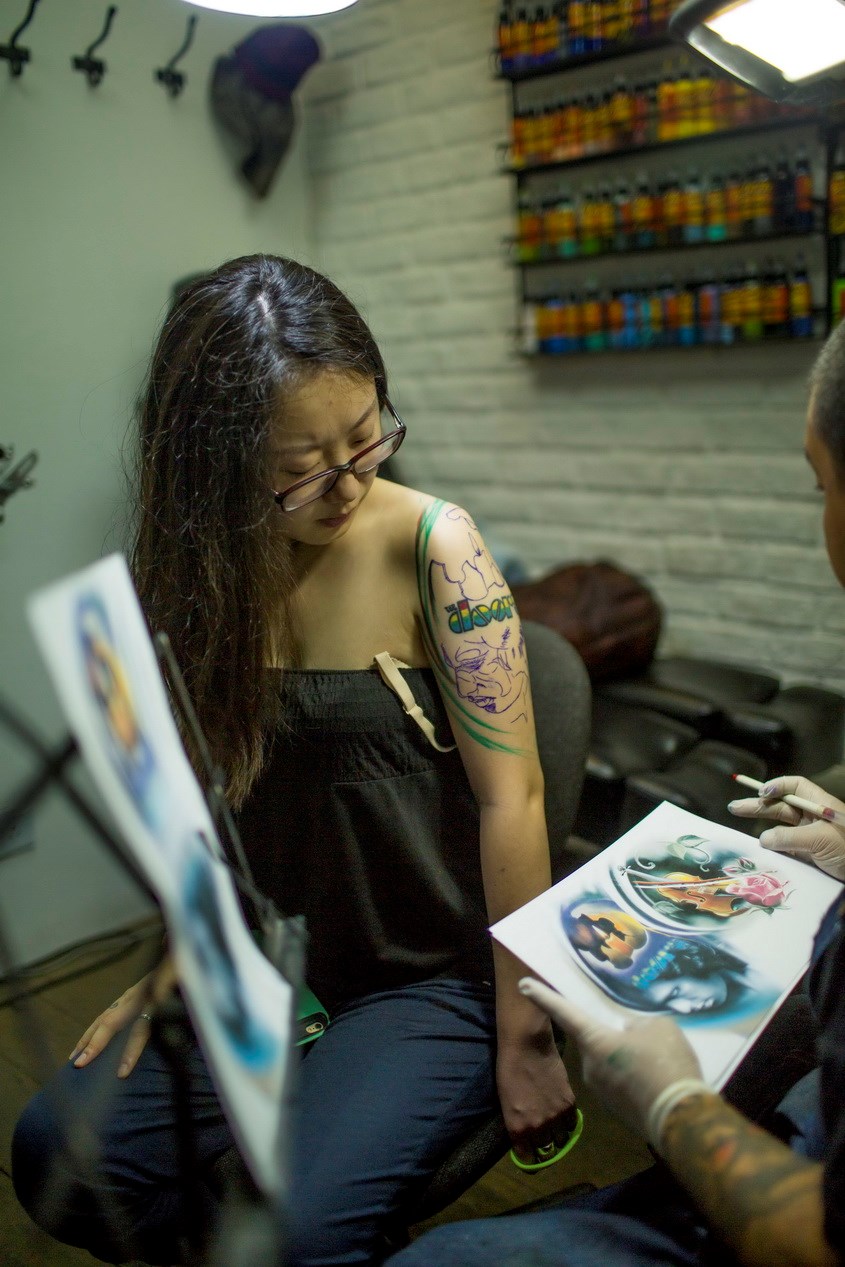
I got my first tattoo in 2001. I did it in Guangzhou and it was quite small – the cover of the Red Hot Chili Peppers' first album. My last one was done in 2006, before I got too busy to sit down for more.
What I like most about tattoo art is that it’s a one-man job. It’s just you and the tattoo gun. It’s empowering.
The industry is still part of a sub-culture, and still very much linked with popular culture, but personally, I’m trying my best to ‘drag’ it into more into what you would categorize as art.

I usually charge RMB5,000 and up for a tattoo. An arm-length one would cost you around RMB50,000. I don’t have a specific style – I do old school, new school, tribal – but what’s a constant is they are always my designs. I refuse customers who won’t take that.
I like working in Shanghai. I think the city is at the frontier of China’s tattoo scene and culture. People are quite open-minded about it, they have an unbiased attitude and pay proper respect to this art and our artists. They are more aware of good and bad tattoos. Of course judgment is still pretty rooted in society, but things really have changed greatly. I think it’s safe to say that the country is ready to accept this art, though it still has a long way to go to catch up to an international level. That’s the next phase.
// www.rptattoo.com
Zhuo Dan Ting 卓丹婷

I’m from Harbin, which had a pretty cool underground scene when I was growing up. I first got introduced to tattoo art through a friend of a friend – I was 16 at the time. He gave me my first tattoo. We did it at my place. I hid it for two years, although my parents are quite open-minded. Once they found out, I even gave my dad one.
I’ve always liked drawing, so once I finished high school I enrolled at Harbin Normal University to study art. I was different from my peers – I liked heavy metal, wore messy clothes. My art was different, too. I started hanging out with heavy metal, punk types, many of whom were tattooed. I got hooked and decided to actively try to understand the art better. I started hanging out at the only two studios in town, learning from artists who had studied in bigger cities like Guangzhou or Beijing. A couple of years after that, I quit university to become a full-time tattoo artist.
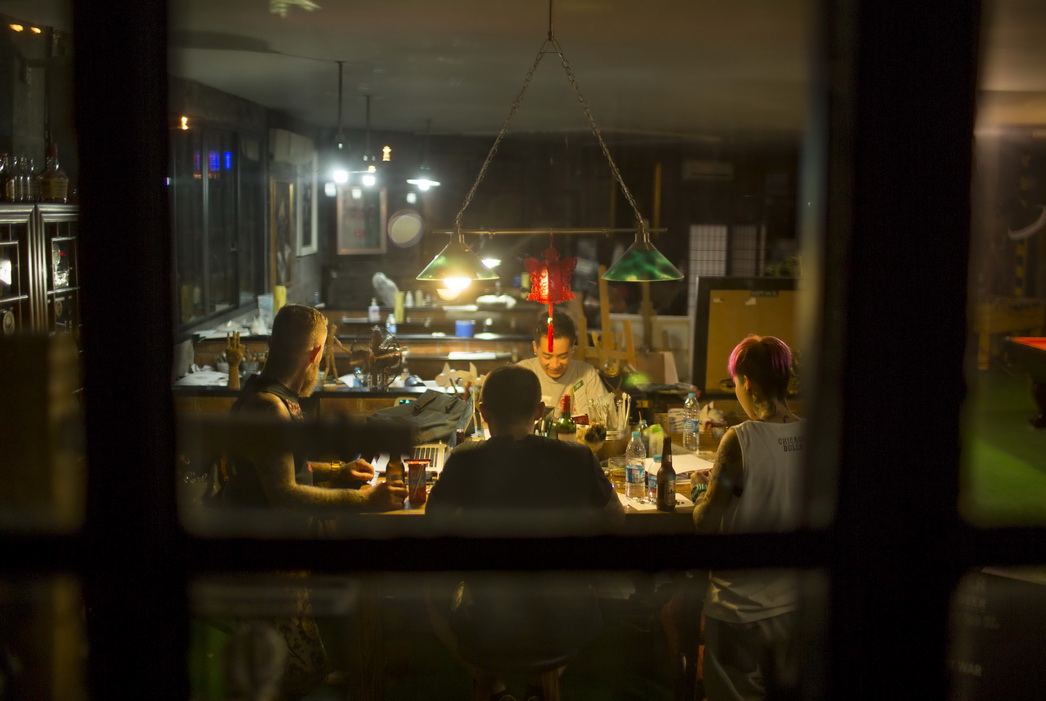
I went to study all over China, then opened my first studio in Harbin. I stayed there three years, building my reputation – people started traveling from all over the country to come get tattooed by me. After that, I moved to Shanghai. I opened Shanghai Tattoo in 2007 first, in a tiny space on Zizhong Lu. News spread, and before I knew it, we started having long waiting lists. Lots of requests. I had to move to a bigger place at the Cool Docks to meet demands. In 2011, I moved again, and opened this location on Maoming Lu. Business has just kept flourishing.
People, some people, are obviously intimidated by the way I look. But I don’t care.
I love tattoos for how different they make you from other people. I always design my own works, and my team does the same. We all have different styles. I focus on portraits, black and white designs. I’m into European and American-style realistic tattoos a lot, but also large Asian-style ones. I always like to draw something special.
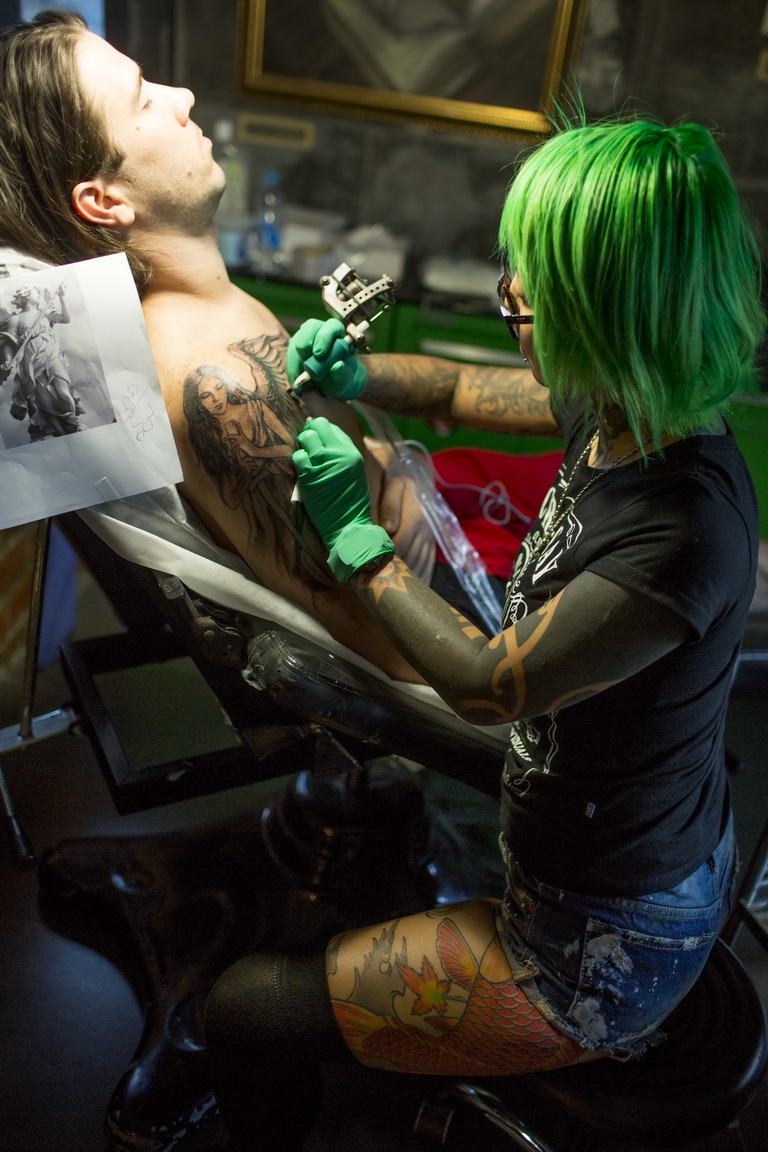
I am not sure how many tattoos I have now. I keep changing what I already have, adding, covering. Sometimes I’d think of something and get it done. It’s an addiction.
People, some people, are obviously intimidated by the way I look. But I don’t care. China has no doubt made some progress since I was a teenager in Harbin, there’s less of a stigma, but some types, they just can’t accept people looking different.
By Steve George, Marianna Cerini and Zoey Zha. Photos by Nicky Almasy





















0 User Comments